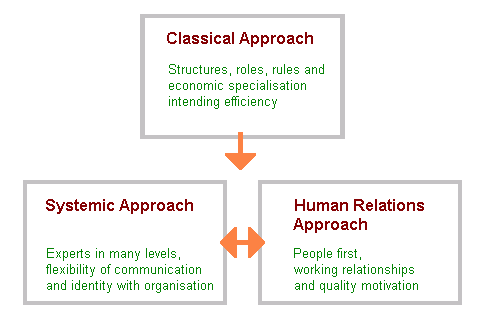
The classical school of management derives from the sociology of Weber, the scientific management findings of Taylor, Gantt and Gilbreth, and the administration perspective findings of Fayol, Urwick and Brech.
The classical school looks for universal principles of operation in the striving for economic efficiency. The organisation works within itself and only within itself. It emphasises management separated from labour, and labour specialised down to the smallest specialised tasks to which the most suitable (in each case) personnel are trained. They need to be trained to nothing else.
His definition of management falls into the classical definition concerned as it is with structure.
| To manage is to forecast and plan, to organise, to command, to co-ordinate and to control. (Quoted in Lucey, 1991, 66) |
This industrialist generated fourteen prescriptive principles of management:
| Authority | Giving orders |
| Discipline | Respect |
| Centralisation | Always some central authority |
| Scalar chain | Top to bottom line of authority |
| Order | Right person in the right place |
| Unity of command | One person being one superior over others |
| Unity of direction | One head giving one plan for a group |
| Paramount general interest | Interests of organisation over any one person |
| Division of work | Reduced span of effort |
| Esprit de corps | Teamwork encouraged |
| Initiative | Encouraged but within organisational limits |
| Stability of tenure | Appropriate settling in time for all |
| Remuneration | Fair both to the organiation and the employee |
These principles are more general than the extreme means of Taylorism, such as the encouragement of initiative and teamwork encouraged. These raise issues of communication and move towards more systemic approaches if they were really encouraged.
Certain principles stand out and are shared throughout the classical approach:
|
Scalar/ hierarchical principle
The chain of authority should be unbroken downwards leading from more authority to less. Managers carry out authority, more higher and more overall, less lower down and more detailed in day to day terms. Operations are lower, strategy is higher. This needs an upwards information chain, however, whereas people in roles and organisations with rules can become important in themselves: the old saying is that the Pope is the last person to know. |
|
Unity of command
This is looking upwards. A subordinate receives orders from only one person just above (no matter how many subordinates that person covers). This is so classical it is unrealistic, given the variety of operations in an organisation. Systemic theorists instead consider how different operations can communicated to people taking their findings. |
|
Span of control
This is about actual numbers of subordinates looking downwards. The direct control a manager has is fewer in terms of people higher up the scale, and more people by managers lower down. The kinds of decisions higher up are more varied and wide ranging, whereas the decisions taken lower down are predictable and repetitive and cover more people. Each subordinate (that is, a manager or worker below) is managed in an overall fashion by the superordinate. The problem is whether specialisation into levels of expertise allows a manager above to have an overview based on equivalent information; the second problem is whether strategic oversight can be step by step hierarchical. Overviews may be unevenly placed in organisations depending on shat people do, know and understand. |
|
Division of labour and specialisation
The narrower the task, the more expert a person can become, and therefore the more efficient. It is Adam Smith economics. What the classical approach does is fit this into organisations. The problem is alienation or anomie, as one just ends up being a human robot. |
|
Correspondence of authority and responsibility
The more responsibility one has, the more in authority one is. As one goes down the organisation, authority reduces and so does responsibility. In more contemporary times, psychologists have argued for more responsibility as it gives a greater sense of ownership and care over the task. It means more authority too, so even the lowest worker should be listened to. The contradiction in the classical theory is that the lowest worker is also a specialist, and more so than the supervisor, and therefore carries some authority from the skill achieved. |
They do not exactly cater for human needs. Weber saw organisations as a capitalist logic, and indeed as a depressive future. Since then, however, the claim that these organisations improve efficiency have been questioned: with the counter claim that workers who feel a sense of empowerment and ownership, and who take decisions, and where technical expertise determines some management, produces a higher quality value added product where individual and team psychology unites with the objectives of the organisation.
Nevertheless, these classical theories showed that:
The result therefore was the systemic approach (which describes the classical ans mechanistic) and the human relations approach.

Lucey, T. (1991), Management Information Systems, 6th Edition, London: DP Publications, 61-73.
Adrian Worsfold